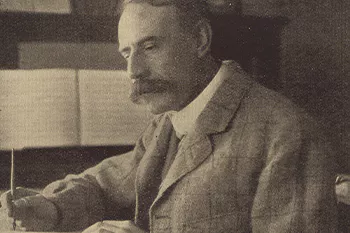A note from the composer...
Silver Rose is a musical response to five poems by Bristol born poet Isaac Rosenberg (1890-1918), who died in action during World War 1. Working collectively like a song cycle, the poems are read before and during each of the five musical movements; the lyrical line can be clearly traced in the first, third and fifth (On Receiving News of the War, A Careless Heart and Song) whereas the second and fourth (Beauty and Returning, We Hear the Larks) are a more dramatic and aesthetic reflection. The choice of texts for the musical settings echo perspectives including the atrocities of war and hope for peace.
The title, Silver Rose, takes its name from two sources. The 1914 Star was a British campaign medal awarded to men who served in France or Belgium between 5th August and 22nd November 1914. Those who fought under enemy fire were also entitled to a bronze horizontal clasp engraved with the above dates and could attach a small silver rose to the ribbon when not wearing the medal. The final movement of the work, Song, also includes the words 'silver rose'.
Silver Rose was commissioned by Bristol City Council with funding from Arts Council England and first performed by Lydbrook Band, conductor Ian Holmes, narrator Robert Hardy CBE, Bristol Museum and Art Gallery, 9 November 2014.
A version of this work for brass band and soprano, also brass band, narrator and baritone solo is also available.
Press accounts from the performance by Brighouse and Rastrick Band, David Bremner, Micha Lazarus, RNCM International Brass Band Festival, 26 January 2025.
"Eloquence of the deepest meaning came with Liz Lane's Silver Rose; a lament to both personal and collective loss of huge resonant meaning, as narrator Dr Micha Lazarus was a relative of the original poet Isaac Rosenberg who died in action during the First World War. The beauty of the text, recitation and music stilled the air.'
4barsrest, January 2025
"It's hard to fully articulate the power of this piece is you haven't heard it live and I fear I can't do it justice with words alone, so forgive me.... The piece was more than simply narration set to music, it felt like a concerto of spoken word with both the words of Rosenberg and the music of the band working hand in hand to tell the story of the human experience in the dark days of WW1. Towards the end of the piece, the band stands to play a warm but deeply emotive hymn-like section and the lights dim paying tribute to the lives lost. It was an unbelievably impactful performance.
It's not a trumpet, Facebook, January 2025
![Serenata [world premiere in the wind band version] | The Royal Marines Band](https://cdn.prod.website-files.com/5cb49828bba38cfab910a45a/697113ac122b7add512bab2f_Screenshot%202026-01-21%20175249.png)

